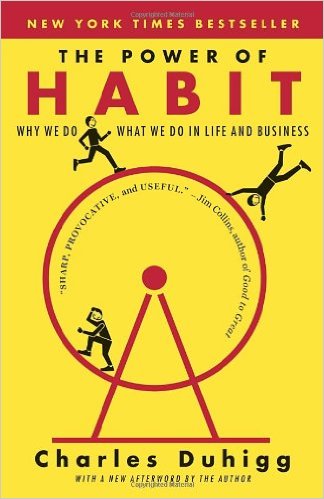Habits: Building them, breaking them

by Kathy Kuhl
How do we help our kids develop good habits? Why are bad habits so hard to break?
“Habits emerge, scientists say, because the brain is constantly looking for ways to save effort,” says Pulitzer Prize winner writer Charles Duhigg in his book, The Power of Habit. When you act by habit, your brain is freed to give your attention elsewhere.

When I drive, I’m not thinking about exactly how far from my driveway I need to begin turning the steering wheel. I just pull in. But when I was learning, that simple turn took concentration and planning.
Remember when you learned to write in cursive? Every motion was an effort. It was tiring to pay attention and develop good technique. But now you write without thinking about how.
Duhigg explains how habits begin, what builds a habit and keeps it going, how addictions work, how companies try to build in us the habits of buying from them, and more. He explains the importance of starting with fixing a tiny habit. The book is easy to follow and well-researched. The last chapter covers practical ideas on how to develop new good habits.
There was, alas, no easy fix for stopping bad habits or launching good ones. But the book helped me understand habits better and helped me make a little progress developing some good habits.
Duhigg explains that habits follow a three-step loop:
- A cue, or trigger tells your brain to go onto auto-pilot and which habit to use.
- You follow a routine, which can be physical, mental, or emotional.
- Then comes a reward, which helps your brain figure out whether this is a good loop to remember.
Here’s the first point I found interesting: as the loop become automatic, the cue and the reward become intertwined. You start anticipating the reward and almost enjoying it in advance. (p. 19) You see the chocolate and start imagining its taste, craving it. The mosquito bite itches, and you start thinking how good it would feel to scratch it. Your phone buzzes, you think, “That call or text may be important/interesting. I’ve got to look.”
In the last chapter, Charles Duhigg offers advice on how to change a bad habit by finding a new cue and reward to go with the same cue. If I feel restless while writing, instead of turning to Facebook, I can stand up and walk down to my mailbox, do some push ups, or put in a load of laundry.
Duhigg explains why it’s especially important to reward yourself for new habits. Telling yourself, “Good job!” helps. Savoring the small successes helps. Pay attention to what kinds of rewards motive yourself and your children.
Ever give your child stickers, stars, or points for progress? Here’s a grown-up version. I’m using an app on my smartphone called iRunURun, and rewarding myself with points for every day I do any push-ups, writing in my journal, or log how much time I spend working. It’s silly, but seeing that little graph showing how many points I’ve earned this week motivates me.
Because many of us with exceptional kids enjoy learning about how brains work, I’m going to recommend Charles Duhigg’s The Power of Habit. I was particularly intrigued how marketers try to get loyal to their stores at key times in our lives, such as when we’re having babies.
But if you want to learn more now without reading the book yet, see Ken Sande’s Relational Wisdom 360 Blog. He is writing a good series on how principles in The Power of Habit apply to relationships. I appreciate Ken Sande’s biblical perspective, but even if you don’t, you’ll still find an excellent summary of Duhigg’s principles.
You can also learn more about building new habits by looking at this TedX talk by Charles Duhigg on how to teach willpower.
What helps you form or break a habit? Please share your tips, progress, or questions below.




This sounds like a fascinating book. Thanks for adding the review to DifferentDream.com’ Tuesday special needs link share.